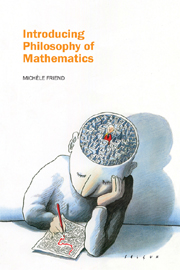5 - Constructivism
Summary
Introduction
To further understand realism, it is useful to contrast it to its opposite position: anti-realism. Most of the philosophical positions in this book were developed as reactions to problems concerning platonism. The reactions can be moderate, as when we modify platonism slightly, but the constructivist is an anti-realist and, as such, wholly rejects the realist thesis that mathematical objects, or mathematical truths, are independent of us. Instead, for the constructivist mathematics is fundamentally a construction of our minds. We do not discover mathematical truths or objects; we construct them. The constructivist also thinks that our minds have tried to construct quite fabulous objects, but that they are not legitimate fabrications. The process of coming up with them was misguided. To continue the metaphor, some of the “constructions” of the realist are flawed. The constructivist urges a rethinking of the foundations of construction for mathematics. In particular, the logic guiding the construction of mathematical objects has to be epistemically constrained. We shall see that the constructivist thinks quite differently from the realist; he has a different underlying logic from the realist. The logic acts as a different norm of reasoning from classical logic. Constructivists share the feature that they want to revise classical logic.
We have so far been using the terms “anti-realist” and “constructivist” interchangeably, but will now clarify the vocabulary. “Anti-realist” is a general philosophical term. One can be an anti-realist in ethics, science, language and so on. Constructivists are anti-realists specifically about mathematics.
Information
- Type
- Chapter
- Information
- Introducing Philosophy of Mathematics , pp. 101 - 126Publisher: Acumen PublishingPrint publication year: 2007
